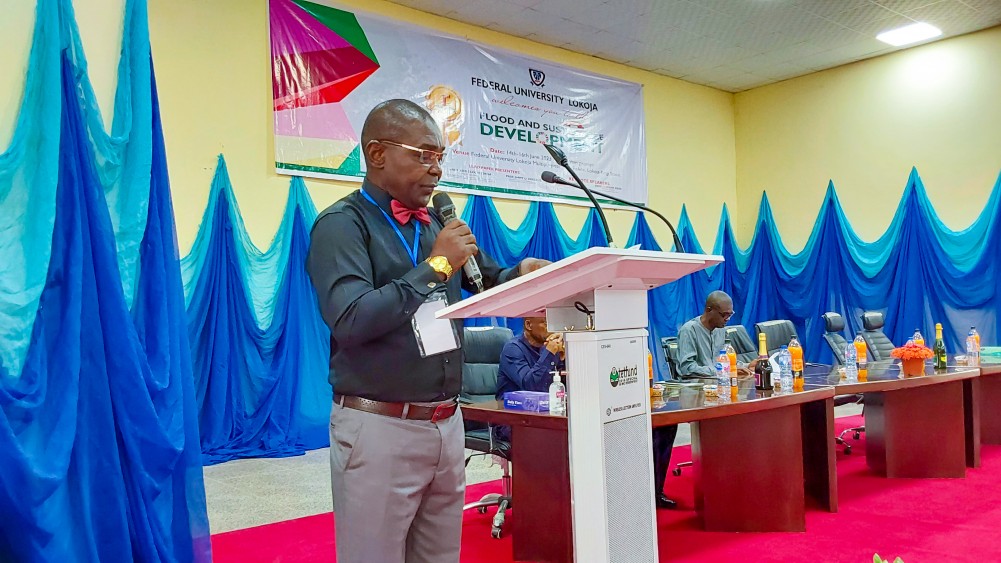Most Recent News
Communique Issued at the End of the First International Conference Organized by FUL on Flood and Sustainable Development from 14th-16th June, 2023
-
 Chris Yahaya
Chris Yahaya
- June 19, 2023, 9:09 pm

COMUNIQUE ISSUED AT THE END OF THE FIRST INTERNATIONAL CONFERENCE ON FLOOD AND SUSTAINABLE DEVELOPMENT HELD WEDNESDAY 14TH TO FRIDAY 16TH JUNE, 2023 AT THE FEDERAL UNIVERSITY LOKOJA, LOKOJA - NIGERIA
Preamble
The Federal University Lokoja hosted a cross-section of stakeholders to its first international conference on the theme: “Flood and Sustainable Development” held on 14th - 16th June, 2023 at the University’s permanent campus, Felele and its College of Health Sciences, Adankolo. The conference had fifty paper presentations by scholars and researchers across the globe, with two lead papers presented by Professor Jimmy O. Adegoke of the Department of Earth and Environmental Sciences, University of Missouri -Kansas City and Professor Temi Ologunrisa, the Vice-Chancellor, Olusegun Agagu University of Science and Technology, Okitikupa, Ondo State.
The keynote papers were presented by Engr. Clement Nzeh, the Managing Director/Chief Executive Officer of the Nigeria Hydrological Services Agency (NIHSA), Alhaji Abubakar Sadiq Yelwa, Managing Director//Chief Executive Officer of the Hydroelectric Power Producing Areas Development Commission (HYPPADEC), represented by Mr. Jimoh Haruna Gabi, Director of Administration and Finance of the commission, and Chief Dr. George N. Muoghalu, the Managing Director/Chief Executive Officer, National Inland Waterways Authority (NIWA). Commitments and goodwill messages were registered by His Excellency, Alh. Yahaya Bello, CON, the Executive Governor of Kogi State, ably represented by Hon. Victor Adewale Omofaiye, the state commissioner for environment; Other stakeholders in security and law enforcement such as Nigerian Police Force, Nigerian Army Record Command, NNS Lugard, Department of State Security Service, Nigeria Security and Civil Defence Corps (NDCDC), and Nigerian Television Authority (NTA) were present.
Observations/Submissions
In the course of extensive intellectual discourses, the following observations and submissions were brought forth, that:
- flooding as a phenomenon has had devastating effect on human population and there is the need to mitigate this effect by bringing together the town and the gown for collaborative effort in tackling this disaster;
- the strategic importance of the confluence of the Niger-Benue Rivers in this perennial flooding and the forum has provided the avenue for gaining a better understanding of the ecological and environmental factors that contribute to floods in the Niger-Benue trough;
- flood is inevitable in human society because of natural and anthropogenic factors but measures must be put in place to tackle its effects on humans and the environment, calling on relevant government agencies must synergise to proffer lasting solutions to the problem of flood in the region and its environs - a good instance being NIHSA’s efforts at producing an Annual Flood Outlook to manage flood;
- efforts and resources should be channeled preventive measures to avert flood disaster rather than providing reliefs only after it has happened;
- since flooding is universal, reflecting the broader challenges posed by climate change, there is therefore the need for deliberate efforts to adopt a multi-pronged approach through investment in resilient infrastructure such as building and maintaining robust drainage systems, creation of reservoirs, flood barriers, divergent structures and implementing sustainable urban planning practices;
- flooding has negatively impacted communities in the Niger-Benue trough in the following ways: loss of human life, damage to properties, destruction of crops, loss of livestock, non-functioning of infrastructure and deterioration of health conditions owing to water borne diseases - with other socio-economic impacts of flood including, decreased purchasing and production power, mass migration, psycho sociological effect, limited economic growth and development, and low political participation, discontent or loss of trust in authorities leading to social unrest.
- floods in communities along the Niger-Benue trough can be controlled through the following practices: construction of flood ways (man-made channels) to divert flood water, regular dredging of the inland waterways, channels and rivers, construction of levees and dykes, sensitization, raising of roads to reduce run-offs and prevent water being diverted to homes at lower elevations and clearing of drainage;
- Nigeria needs to have a development plan that adequately provides for flood disaster management;
- the challenges of flood risk in the Niger-Benue Trough and Nigeria are as a result of inadequate flood control structures as the existing ones are either too old and weak to perform maximally – aging dams, inadequate dam monitoring and maintenance, lack of flood risk awareness, inadequate solid waste, sewage, drainage and flood zone management; no integrated water resources planning at national and state level;
- there is need for improvement in collecting, assessing, and sharing environmental and climatic data for planning, policy and investment purpose, including better coordination between MDAs;
- there is need to ensure community participation in planning, implementation and monitoring of disaster preparedness activities- development of effective early warning on floods and dam water releases and a good knowledge of hydro meteorological parameters are germane to any flood management strategies in the Niger-Benue Trough;
- there is the need to build the capacity of communities and invest in institutions saddled with the responsibility of flood prevention, control and management;
- there is need to begin to build climate smart infrastructure that are durable and sustainable such as dams, drainage and roads;
- there is need for the review of the existing land use laws and an urgent need for preparation of a flood sensitive master plan.
- land use planning should move beyond relying on national elements and incorporate a combination of structural and non-structural measures to reduce flood.
- media literacy plays a critical role in enabling individuals to critically evaluate and interpret flood-related information, ensuring a more informed understanding of risk and promoting responsible decision-making.
- there should be incorporation of media education into existing disaster preparedness plans.
Resolution(s):
At the end of the stimulating three days conference, the following resolution was reached:
- The Federal University Lokoja, given its strategic location and willpower, shall establish a centre for flood prevention and management in Nigeria- a centre to lead innovation and intellectualism in the area of flood research.
- Federal Government should make or enhance annual budgetary provision for flood control and management, to avert perennial flood disaster in the confluence city of Lokoja and other flood prone areas.
Conclusion/Appreciation
At the close of the conference, Professor Olayemi Akinwumi, the Vice Chancellor of the university, appreciated all conferees, agencies and bodies that supported the event in one way or the other. He specifically and passionately appealed to relevant stakeholders to identify with the university towards the establishment of the said centre.
Professor Muhammed Suleiman Audu
Chairman, LOC
Dr. Joseph Olaniyi Folorunsho
Secretary, LOC
For regular updates, follow Federal University Lokoja on - Website: www.fulokoja.edu.ng Linkedin: www.linkedin.com/company/fulokoja Facebook: www.facebook.com/fulokoja Twitter: www.twitter.com/fulokoja and YouTube: www.youtube.com/@fulokoja001
Latest News
-
Important Notice to Students on Exam Rules and Regulations
April 13, 2024, 6:30 pm -
Eid-el-Fitr: FUL VC, Prof. Akinwumi Sends Message to Staff and Students
April 10, 2024, 9:30 am -
No Lassa Fever Case in FUL as Varsity Medical Center Issues Health Advisory
April 9, 2024, 3:17 pm -
Drug Abuse and its Consequences by Pharm (Mrs) Kudirat Nasiru - FUL Health Corner
April 5, 2024, 11:34 pm -
Prioritize Your Academic Pursuit - FUL VC, Prof. Akinwumi Tells 4,925 Matriculating Students
April 5, 2024, 10:30 am -
Int'l Linkage: FUL Moves to Partner University of Waterloo, Canada
April 4, 2024, 7:48 pm -
FUL Forges Partnership with World Bank-Assisted Project, ACReSAL
April 4, 2024, 3:55 pm -
Establishment of Law Faculty Gathers Momentum as FUL Mgt. Convenes Meeting with Senior Lawyers in Abuja
April 3, 2024, 10:30 am